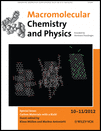
MACROMOLECULAR CHEMISTRY AND PHYSICS
metrics 2024
Navigating the Intersection of Chemistry and Physics
Introduction
MACROMOLECULAR CHEMISTRY AND PHYSICS, published by WILEY-V C H VERLAG GMBH, is a prominent journal dedicated to advancing the fields of condensed matter physics, materials chemistry, organic chemistry, physical and theoretical chemistry, and polymers and plastics. With an impressive H-index and a Q2 ranking in various relevant categories for 2023, this journal serves as a crucial platform for researchers and professionals to publish their innovative findings and theoretical advancements from 1994 to 2024. The journal's commitment to high-quality research is reflected in its Scopus rankings, which highlight its significant impact within the scientific community. Although it does not currently offer open access, it remains an essential resource for those seeking to explore the intricacies of macromolecular science. With a growing global audience, MACROMOLECULAR CHEMISTRY AND PHYSICS continues to shape the future of materials and polymer research, making it a must-read for students, researchers, and industry professionals alike.
Metrics 2024
 0.50
0.50 2.50
2.50 2.50
2.50 129
129Metrics History
Rank 2024
Scopus
IF (Web Of Science)
JCI (Web Of Science)
Quartile History
Similar Journals

POLYMER SCIENCE SERIES C
Navigating the Complexities of Polymer ResearchPOLYMER SCIENCE SERIES C is a distinguished journal published by MAIK NAUKA/INTERPERIODICA/SPRINGER, focusing on advancing research in the fields of polymer science and materials chemistry. With an ISSN of 1811-2382 and an E-ISSN of 1555-614X, this journal has been actively disseminating vital findings since its inception in 2000, aiming to converge knowledge and innovations until 2024. Operating out of the United States, it stands out with its current quartile rankings of Q3 across several categories, including Chemistry (miscellaneous), Materials Chemistry, and Polymers and Plastics, highlighting its evolving significance in the academic community. Despite its open access status, the journal attracts an engaged audience of researchers, professionals, and students, providing a platform for the publication of rigorous peer-reviewed articles that explore the intricacies of polymer synthesis, characterization, and applications. POLYMER SCIENCE SERIES C not only serves as a vital resource for keeping abreast of recent developments in polymer research but also stimulates interdisciplinary collaborations and innovative approaches in material science.

POLYMER BULLETIN
Illuminating the Path of Polymer DevelopmentsPOLYMER BULLETIN is a prominent journal in the field of polymer science, published by SPRINGER in Germany. Established in 1978, this peer-reviewed journal focuses on the latest research and developments in polymer chemistry, materials science, and condensed matter physics, boasting a commendable impact factor indicative of its rigorous academic standards. With a Q2 ranking in multiple categories including Chemistry (Miscellaneous), Condensed Matter Physics, Materials Chemistry, and Polymers and Plastics, POLYMER BULLETIN serves as an essential resource for researchers, professionals, and students aiming to stay abreast of innovative findings and methodologies within these interdisciplinary landscapes. Although the journal does not currently offer open access, it provides invaluable insights and data that significantly contribute to the advancement of polymer science. For more information and to access published articles, visit the journal's page on the Springer website.
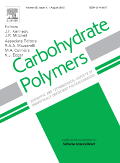
Carbohydrate Polymers
Connecting researchers through impactful discoveries.Carbohydrate Polymers is a prestigious academic journal, published by ELSEVIER SCI LTD, that plays a vital role in the field of materials chemistry, organic chemistry, and polymer science. With its Q1 category rankings in these domains, this journal serves as a critical platform for disseminating high-quality research, innovative methodologies, and significant advancements in carbohydrate-based polymers. Since its inception in 1981 and continuing until 2025, it has fostered critical discussions and collaborations among researchers, professionals, and students worldwide. Although it does not offer open access, its rigorous peer-review process ensures that only the most impactful studies are published. By highlighting new developments in the synthesis, characterization, and application of carbohydrate polymers, Carbohydrate Polymers consistently contributes to the enhancement of knowledge and technology within its field, making it an essential resource for anyone working at the intersection of chemistry and materials science.
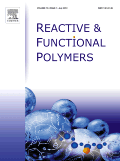
REACTIVE & FUNCTIONAL POLYMERS
Unveiling Breakthroughs in Reactive and Functional Polymer ResearchREACTIVE & FUNCTIONAL POLYMERS, published by Elsevier, is a leading journal in the field of polymer science, focusing on the innovative development and application of reactive and functional polymers. With an impressive impact demonstrated through its classification in various prestigious categories, including Q1 rankings in Chemical Engineering, Chemistry, and Materials Chemistry, this journal serves as an essential resource for researchers and professionals seeking to explore the latest advances in polymer research. With a broad scope that encompasses topics from biochemistry to environmental chemistry, and a convergence of significant findings from 1995 to 2024, REACTIVE & FUNCTIONAL POLYMERS fosters academic dialogue and collaboration among scientists. The journal also features Open Access options, ensuring that groundbreaking research is readily available to a global audience. By consistently publishing high-quality articles, it not only enriches the scientific community but also drives innovation across various industries reliant on polymer technologies.
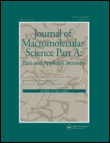
Journal of Macromolecular Science Part A-Pure and Applied Chemistry
Fostering Global Collaboration in Macromolecular ResearchWelcome to the Journal of Macromolecular Science Part A - Pure and Applied Chemistry, a distinguished publication dedicated to advancing the understanding of macromolecular science, encompassing critical areas such as polymers, materials chemistry, and composites. Published by Taylor & Francis Inc, this journal has firmly established its place within the scientific community, evident from its ranking in the Q2 and Q3 quartiles across various categories in the latest assessments, including Polymers and Plastics as well as Ceramics and Composites. With a commitment to providing high-quality peer-reviewed content, the journal aims to facilitate knowledge exchange and innovation among researchers and practitioners from around the globe. The absence of open access underscores the journal's commitment to maintaining rigorous editorial standards while remaining accessible to its readership. As the journal converges through valuable research contributions from 1992 to 2024, it continues to be a pivotal resource for professionals and students seeking to explore the latest advancements and applications in the field of macromolecular science.

INTERNATIONAL JOURNAL OF POLYMER ANALYSIS AND CHARACTERIZATION
Pioneering research in analytical chemistry and polymers.International Journal of Polymer Analysis and Characterization is a distinguished scholarly publication dedicated to the field of polymer science, with a focus on innovative methodologies and significant advances in the analysis and characterization of polymeric materials. Published by Taylor & Francis Ltd in the United Kingdom, this journal serves as a vital resource for researchers, professionals, and students deeply engaged in Analytical Chemistry, Chemical Engineering, and Polymer Science. With a convergence spanning from 1995 to 2024, it holds a Q3 ranking in the 2023 category quartiles for its valuable contributions to the fields of Analytical Chemistry, Chemical Engineering, and Polymers and Plastics. Despite being a non-open access publication, its rigorous peer-review process and comprehensive coverage of current trends ensure that the journal remains a crucial platform for disseminating impactful research. The journal is indexed in various databases, underscoring its relevance and quality in the academic community. Exploratory studies and articles that push the boundaries of polymer analysis find a welcoming home within these pages, making it an essential read for those aiming to stay at the forefront of polymer research.

POLYMER SCIENCE SERIES B
Elevating Knowledge in Polymer SciencePOLYMER SCIENCE SERIES B is a distinguished journal published by MAIK NAUKA/INTERPERIODICA/SPRINGER, dedicated to advancing knowledge in the fields of ceramics and composites, materials chemistry, and polymers and plastics. The journal, identifiable by its ISSN 1560-0904 and E-ISSN 1555-6123, spans a significant timeline from 1996 to 2024, reflecting its commitment to preserving and disseminating cutting-edge research in polymer science. With its current ranking in the Q3 category across relevant fields, it supports scholars and professionals in enhancing their understanding and application of polymeric materials. While it operates on a non-open access basis, the journal is pivotal for researchers seeking in-depth analysis and peer-reviewed studies. Located in the heart of the United States at 233 Spring St, New York, NY 10013-1578, POLYMER SCIENCE SERIES B serves as an essential resource for committed researchers, professionals, and students aiming to push the boundaries of polymer science.

POLYMER SCIENCE SERIES A
Fostering Collaborative Insights in Polymer SciencePOLYMER SCIENCE SERIES A is a distinguished journal dedicated to the field of polymer science, with a focus on advancing knowledge in materials chemistry and polymers and plastics. Published by MAIK NAUKA/INTERPERIODICA/SPRINGER, this journal provides a platform for researchers and practitioners to disseminate their findings and innovations. With an ISSN of 0965-545X and an E-ISSN of 1555-6107, it is widely accessible to the academic community. Although currently non-open access, the journal has maintained its significance since its inception in 1991, boasting an evolving emphasis on contemporary issues in polymer science up to 2024. Ranked in the Q3 category for both Materials Chemistry and Polymers and Plastics in 2023, POLYMER SCIENCE SERIES A plays a crucial role in the broader academic landscape, particularly for those committed to understanding and enhancing polymer materials. The journal’s reputation is solidified by its Scopus rankings, where it addresses critical advancements and fosters collaborative research opportunities within the community. We invite researchers, professionals, and students to explore the valuable insights published within these pages.
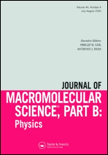
Journal of Macromolecular Science Part B-Physics
Driving Knowledge at the Nexus of ScienceThe Journal of Macromolecular Science Part B-Physics, published by Taylor & Francis Inc, is a critical platform for advancing knowledge in the realms of macromolecular science and interdisciplinary research at the intersection of physics, chemistry, and materials science. With an ISSN of 0022-2348 and E-ISSN of 1525-609X, this journal has been a cornerstone of scientific discourse since its inception in 1967, continuing to offer invaluable insights and innovative findings through to 2024. The journal holds a Q3 ranking across several disciplines, including Chemistry (miscellaneous), Condensed Matter Physics, Materials Chemistry, and Polymers and Plastics, reflecting its relevance and importance within the scientific community. Although it does not support open access, the rigor of its peer-review process ensures that published articles meet the highest standards of scientific excellence. Researchers, professionals, and students alike will find the journal an essential resource for the latest trends and discoveries in macromolecular physics, aiding in both academic pursuits and practical applications in material design and analysis.
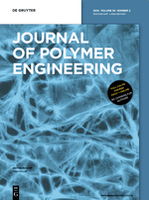
JOURNAL OF POLYMER ENGINEERING
Innovating Solutions Through Polymer Engineering.JOURNAL OF POLYMER ENGINEERING, published by Walter de Gruyter GmbH, stands as a pivotal platform in the field of polymer science and engineering. With an ISSN of 0334-6447 and an E-ISSN of 2191-0340, this journal has been a vital contributor to the academic landscape since its inception, spanning publications from 1981 to 2024. As a recognized entity in the realms of Chemical Engineering, Materials Chemistry, and Polymers and Plastics, it holds a respectable position in Q3 quartile rankings according to the latest assessments. The journal is positioned to promote the exchange of cutting-edge research findings, technological advancements, and critical reviews that address the complexities of polymer application and innovation. Researchers and professionals will find a wealth of information, from experimental methodologies to theoretical analyses, all designed to inspire and elevate the current understanding of polymer engineering. By fostering collaboration and dissemination of knowledge, the JOURNAL OF POLYMER ENGINEERING remains crucial for advancing research and education in its specialized domains.